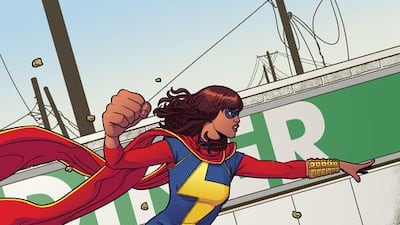When Sana Amanat created the Muslim superhero Ms Marvel, it was a chance to go back in time and give her younger, conflicted self all the superpowers she lacked as a teenager.
But Kamala Khan has come to represent so much more than the reinvention of an awkward, troubled teenager – even if Amanat never intended her to be loaded with political symbolism.
In the weeks since Donald Trump’s inauguration as president of the United States, the country has seen deep cracks opening up and divisions drawn that threaten the future of immigrants and Muslims in the country.
With her blue-and-red costume, it is Khan who has stepped into the breach to use her superpowers and make a powerful statement about Muslims in the US.
Since Trump first came to power, fans of the 16-year-old superhero have whipped up posters depicting her tearing up his photo, punching him in the face, and mourning the current state of affairs.
It is not how Amanat, a comic book editor from Marvel, first envisaged Khan when she created her in 2013 – but she does think the heroine has a role to play in calming stormy waters.
“Those posters were very surprising,” says the 34-year-old, who was in Dubai last week for the Emirates Airline Festival of Literature.
“People have been using her as a political statement. I do not necessarily want her to be one, but I do appreciate the fact she has resonated with so many people and that she stands for signs of love and unity.
“I hope that is what she continues to do. I do not want her to go out and push any type of divisive or violent ideals at all.
“I want to make sure it is always messages of positivity and love because that is who she is more than anything else.
“Like all of our superheroes, Ms Marvel has to be a unifier.
“She is fundamentally an individual who wants people to come together on common goals of positivity and goodness and work together to make all our lives better.”
When Khan first appeared, she took on the mantle of Ms Marvel, originally created in 1968 as Carol Danvers, who has since gone on to become Captain Marvel.
Ms Marvel was inspired by a conversation Amanat had with her senior editor Stephen Wacker about her own experiences growing up in New Jersey as a Pakistani-American Muslim.
“I was talking about the fact it was really hard to be a young Muslim in America and the different struggles I had, like trying to go to the prom, making my own dress that was fully covered, fasting and playing lacrosse, wearing tights underneath my shorts in 90 degree weather and not being able to go on dates,” says Amanat.
“For me, it was so common and everyday, but my senior editor said: ‘Not a lot of people know those kinds of stories.’
“That was the first spark of an idea of creating a character that maybe could resonate with young Sanas out there.”
Amanat, whose writing credits include Captain Marvel and Ultimate Comics: Spiderman, worked with comic writer G Willow Wilson, a Muslim convert, to come up with Khan.
They decided against giving her a hijab because “when people think about Muslim women, they automatically think about a woman with a hijab or a niqab or an abaya”.
“We wanted to fill the script a bit and say there are a lot of people out there who consider themselves Muslims and do not necessarily look like you think,” she says.
“We wanted to find a way to tell a story about a young woman who might not appear overtly Muslim, but still considers herself Muslim and is also American.
“We wanted to showcase all the different worlds that she is living in and the balance that she strikes between that.”
Like her creator, Ms Marvel grew up in New Jersey – but that is where the similarity ends.
After inhaling a mystery gas, Khan can enlarge, shrink and bend her body at will.
She keeps her superhuman powers a secret. And while there has been a backlash from some quarters, the reaction to her has been “overwhelmingly positive”.
“She is just a really fun, quirky, relatable character that a lot of different kinds of audiences have connected with,” says Amanat. “People have been so excited about the fact Marvel has taken a chance on this kind of character.
“Some people have said some really horrible things about her, which is very sad for me. I think they feel she is a surrogate for the Islamist agenda and trying to push Sharia in the country, which is incredibly crazy.”
She adds: “We have negative feedback any time we do anything drastic to the characters. People are very protective of their Marvel superheroes.”
Despite the criticism, Amanat sees Ms Marvel as a way of bringing more women and minorities into the fold in a previously male-dominated environment.
“I am still one of the only females at senior executive meetings,” she told the literature festival. “At the first convention I went to, people did not realise I was actually a comics professional and thought I was one of the working models.
“It has been great to see an evolution and transition to finding a way to engage with people who have been overlooked within comics, both creators and audiences.
“I have been really lucky to be part of that process.”
artslife@thenational.ae

